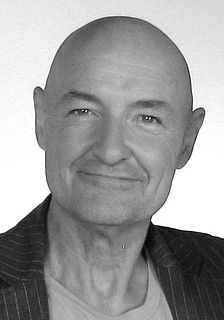A Quote by Bostin Christopher
Then, you also have that, we all have that sense of wanting to belong. We all have that road-rage, you can relate to that road-rage because you're so frustrated. The sense of frustration, the sense of getting caught, doing something wrong, all those are sort of universal emotions and you just have to make it specific to yourself and you channel this, I don't know what it is, but this inner self and then try to capture the vulnerability.
Related Quotes
I would then say that there are two kinds of feeling. The first is to feel in the sense of concentrating your emotions on something immediately available for your understanding: you make your understanding out of the emotions you have about it. The second is to feel in the sense of being affected without trying to understand: something is felt, you do not know what, and it is more important to feel it than to try to understand it, since once you try to understand it you no longer feel it.
Part of the reason I'm writing it is to try to figure out what that is myself. It's not like I came back from Iraq and said, "We need to have a conversation, I know exactly what it is." It was just this sort of sense of something missing and then trying to write toward what that was, and to solicit from other people a sense of what that might be.
And when you are operating within your style, which is your world, which you operate in, then it also would make sense to you. Now, whether it makes sense to anybody outside is besides the point really. You just do it and then you find that other people kind of begin to relate to it and allow themselves to get into your way of thinking about things.
There are six senses: five are outer; they tell you about the world. I say something about the light; without eyes you will not know light. Ears say something about the sound; without ears you will not know anything about the sound. There is a sixth sense, the inner sense, that shows and tells you something about yourself and the ultimate source of things. That sense has to be discovered. Meditation is nothing but the discovery of the inner sense.
Whether I'm on the road or off the road it's really important for me mentally and physically. Physically, when I'm on the road, I work with men that love to eat - I work with former athletes, with men who love to indulge on the road, so I eat like a guy. I have four appetizers, I try their entrees, I eat mine, I like dessert. So I have to make sure that physically, I try to stay in shape. I'm always doing some sort of a workout, and then mentally it just helps a lot with the stress.
When you continuously know and sense yourself as the space of consciousness rather than what appears in consciousness - sense perceptions, thoughts, emotions - then it can be said that you are enlightened... except that you wouldn't think or speak of yourself as 'enlightened', because that would instantly create another mind-based conceptual identity and so it would be the end of 'your' enlightenment.
In the egoic state, your sense of self, your identity, is derived from your thinking mind - in other words, what your mind tells you about yourself: the storyline of you, the memories, the expectations, all the thoughts that go through your head continuously and the emotions that reflect those thoughts. All those things make up your sense of self.
Because men have a history, it is difficult for them to imagine what it is like to grow up without one, or the sense of personal expansion that comes from discovering that we women have a worthy heritage. Along with pride often comes rage – rage that one has been deprived of such a significant knowledge.
Now we cannot...discover our failure to keep God's law except by trying our very hardest (and then failing). Unless we really try, whatever we say there will always be at the back of our minds the idea that if we try harder next time we shall succeed in being completely good. Thus, in one sense, the road back to God is a road of moral effort, of trying harder and harder. But in another sense it is not trying that is ever going tobring us home. All this trying leads up to the vital moment at which you turn to God and say, "You must do this. I can't.



































